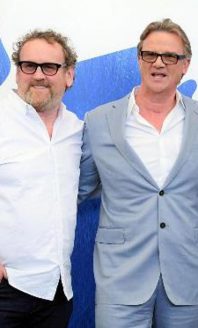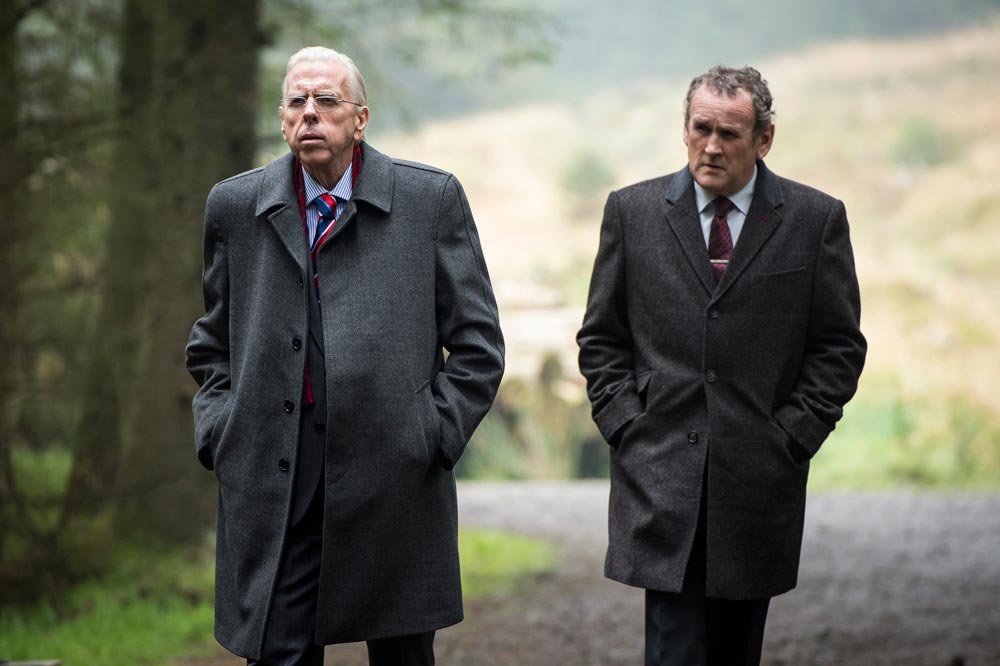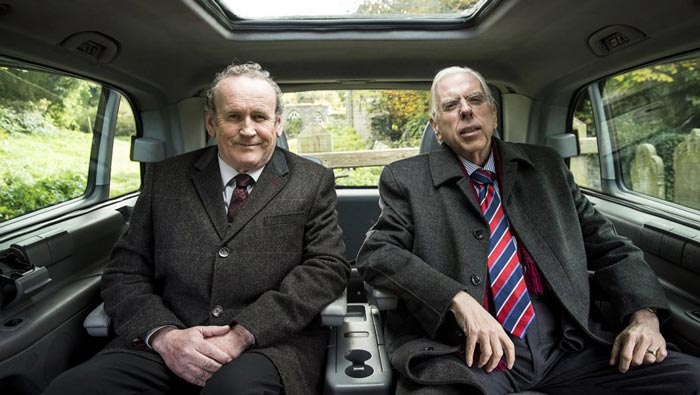
TIFF er meget og mere end blot at se film, og i den forbindelse fik jeg lov til at interviewe instruktør Nick Hamm og skuespiller Colm Meaney fra filmen The Journey. Det komplette interview kan læses nedenfor:
Why did you decide to tell this story? I am only wondering, because me coming from Denmark, I honestly did not even know that this conflict lasted that long. So why did you decide to tell this smaller story, instead of one of the more extravagant parts of the conflict?
Nick Hamm (NH): Because we wanted to tell the story of the friendship between McGuinness and Paisley, and their unlikely political friendship. It was a strange combination, which underpinned, to us, the Irish peace process. We couldn’t really tell their story in a conventional way. We couldn’t really tell it in the five or six years that it happened, so we had to invent a conceit in order to talk about it, and the conceit we invented was by putting both of the characters in the car. By doing that it allowed us to examine their friendship.
Is it more difficult, when you are playing a real person as oppose to a fictional person?
Colm Meaney (CM): They both have advantages and disadvantages. I met Martin McGuiness so I knew him, and obviously he was well known throughout the community and a well known public figure in Britain. The disadvantage are that you have to approximate how he looks, how he sounds and other then that it is very much like playing any other character, in that you play it in the context of the text, within the context of the fiction that Nick just talked about, that we had invented. You have to connect with him deeply on a more personal level, you don’t do an impersonation. You try to be the real guy. So there are advantages and disadvantages of playing public figures.
When I watch the film it starts with this dramatic montage, chronicling the conflict in Northern Ireland. So when the story begins I was kind of surprised by how comedic the film is. Was it during the editing or was it the intention right from the get go, to create this mixture of drama and comedy? Because it is a very serious subject matter.
NH: We always intended it, because we thought that if you tell the story to heavily it wouldn’t do it just. It is to serious a subject matter to be flippant about it, but it is also to serious a subject matter to not treat it with humor, and you have to treat it with humor. Partly, because the Irish have an incredible sense of humor and to do a film about Ireland, which involves two huge politicians like this and not be humorous would actually be a lie, because they were privately very funny individuals. They have a cheeky wit, so we wanted to put that in the movie.
CM: Also, one of the first this that popped out, when I read the script was the humor. These guys would later be known as the chuckle brothers. They shared a lot of jokes, but as Nick [Hamm] said it is more about the way they present their takes to one another and that is where the humor comes from, and it is very much in the script.

I was wondering about the portrayal of Tony Blair, and maybe this is just me being a foreigner, but he felt a bit like a dufus. Was it just Toby Stephens, who decided to do that or?
NH: No, we don’t think of him as a dufus. We just think that he plays the more comedic side of the film. To be quite frank, there are some serious scenes around Toby Blair, and he gives the audience the ability to laugh. We might have sacrificed a level of authenticity with him, to basically allow the movie to play as a movie. His scene intercut with Colm [Meaney] and Timothy [Spall], and some of their scenes are very rough, especially the stuff around the forest. So you, the audience, needs the relief of laughter, it allows them to take the serious stuff in a greater way.
NH: I just have a very simple way of looking at it. My job is simply to help an actor to be better and to help an actor find the truth in the moment, and most good actors, especially these two incredible guys, are already doing that. So what they are looking for is not how to do it, they are looking for guidance in their choices. What they essentially need a director to do is to tell them, should I do that, or should I do that? It is the choices that you make, that distinguishes a great actor from just a normal actor, because anyone can play the moment. But with what depth can you play the moment, how do you treat it? Sometimes I think that is what the actor really needs the director for, to navigate don’t you think [Colm Meaney]?
CM: What Nick does brilliantly is the way to make those choices is to ask a lot of questions. Nick is always saying; “what does this mean, what does that tell you?”. You know asking a lot of questions, and then I just try to shut up… that’s not true.
The other thing Nick brought to this film, which was extraordinary, in my humble opinion, was his energy and commitment to the material. He was this force of nature, who wanted to get this thing made, and that was necessary for…
NH: The subject matter?
CM: Yes, but also the nature of film today and all of the constraints. It is very hard to get this kind of film made and gather the resources to do it.
NH: He is totally right, it is very hard. The amount of independent movies being made are much smaller than ever before. You are either making movies at this level, a five million dollars project, or you are making a 80-90 million dollars project. The movies, that I guess Colm and I have been doing through out our careers are very hard to finance. Everyone has migrated to TV.
CM: Including me.
NH: Colm spent a lot of time in television, because he couldn’t sustain a [movie]career, just as many other.
I was just wondering, since Timothy Spall isn’t here, how was it working with him? And you can be completely honest.
NH: Timothy and Colm have known each other for many years, and Timothy really wanted Colm for the role [of McGuiness]. The process was, that you have to find Paisley first, because he is such a strange looking guy. If you can’t find Paisley, you can’t make the movie.
CM: Exactly.
NH: As soon as Timothy came onboard, and I don’t think I have ever told [Colm] this, but when I talked to Timothy, he wanted you.
CM: Really?
NH: Straight of the get go. It was quite easy for us. I also really wanted Colm to be part of the process of making the film, because I know what is political and cultural tradition is and I wanted that to be present in the fabric of the people. I didn’t want that not to be represented.
I’m talking about the bigger politics of Ireland and it’s very important to me, that we have somebody in the movie, that might not be sympathetic to, but understood that side, than an English actor, who is looking in from the outside.
I’ve actually never said this. This is all new.
CM: We discover things as we talk about them.

What is your favorite moment from this film? It could be during production or something in the final product.
NH: My favorite part? I have to be honest. I love shooting it. I love waking up every day and film. Our favorite bits was the stupid car that we had on the motorway. We had this “Mad Max”-like setup.
CM: This crazy rig with video cameras on the outside of the car. It gave us light, rain, fixed cameras and everything. It was a bizarre looking structure.
NH: We used to drive that down the motorway. We were a caravan of about ten cars with bowsers, battery powered generators and I had a mobile studio. It’s funny that we had all of that just for this. Just for a simple close-up. Funny isn’t it?
I have been wondering, since you both have been working in the industry for so long, do you have any advice for newcomers? Especially since the industry has changed so much since you started.
NH: Everybody will tell you the same: “If you want to make a film, make it.” Don’t let anybody stop you. It’s as simple as that. Whether you make it with 10 dollars or 100.000 dollars, just make it. If you’re a young filmmaker and you are just coming through, attach yourself to older filmmakers and learn. Learn the trade and learn how to work with actors.
CM: Listen to actors.
NH: Yes, listen to actors. I think the main thing is to work with actors that is what I’m always saying, because if you don’t know that, you’re not much use on the film set.
Final question. What do you hope people will get out of this film?
NH: I hope the film stimulates a debate about how to compromise with people you don’t agree with. To engage with people, whose view you oppose. I hope that it show, that in some way anything is possible. Conflict resolution is something well within our grasp and it is very hard to achieve, but the consequences of not achieving it are much worse.
CM: I would echo his sentiment entirely. The film is a celebration of peace, it’s a celebration of that particular process that they went through, but it is also an indication that what seems impossible can be achieved. You must talk to your enemies. There is no point arguing with your friends, because to be able to solve any conflict you need to talk to your enemies. Hopefully this film can encourage people in other situations or conflicts in the world to do that – and give them a laugh while they do.